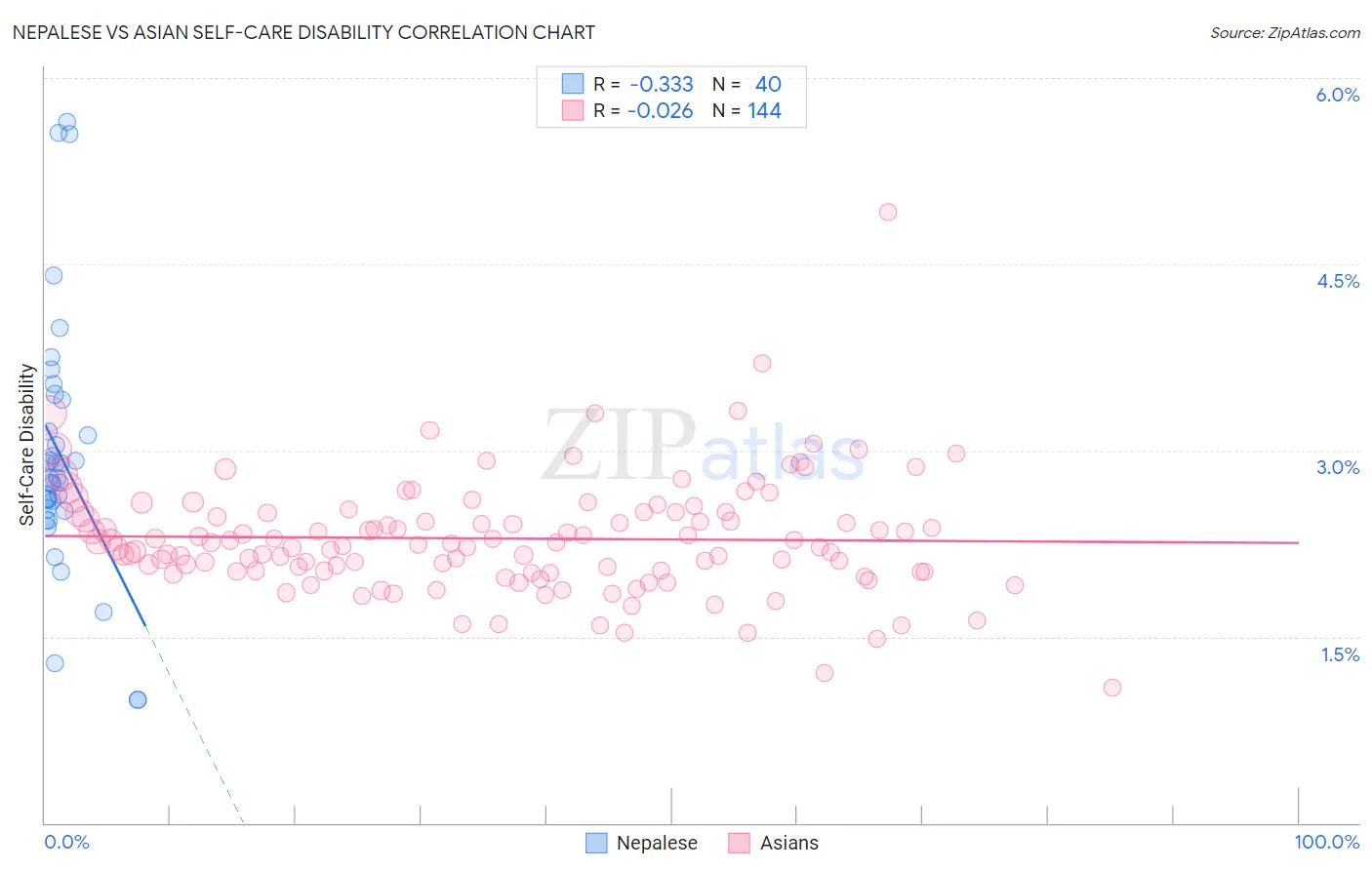Nepalese vs Asian Self-Care Disability
COMPARE
Nepalese
Asian
Self-Care Disability
Self-Care Disability Comparison
Nepalese
Asians
3.0%
SELF-CARE DISABILITY
0.0/ 100
METRIC RATING
330th/ 347
METRIC RANK
2.3%
SELF-CARE DISABILITY
99.2/ 100
METRIC RATING
71st/ 347
METRIC RANK
Nepalese vs Asian Self-Care Disability Correlation Chart
The statistical analysis conducted on geographies consisting of 24,515,553 people shows a mild negative correlation between the proportion of Nepalese and percentage of population with self-care disability in the United States with a correlation coefficient (R) of -0.333 and weighted average of 3.0%. Similarly, the statistical analysis conducted on geographies consisting of 549,189,639 people shows no correlation between the proportion of Asians and percentage of population with self-care disability in the United States with a correlation coefficient (R) of -0.026 and weighted average of 2.3%, a difference of 27.4%.

Self-Care Disability Correlation Summary
| Measurement | Nepalese | Asian |
| Minimum | 0.99% | 1.1% |
| Maximum | 5.6% | 4.9% |
| Range | 4.7% | 3.8% |
| Mean | 3.0% | 2.3% |
| Median | 2.8% | 2.2% |
| Interquartile 25% (IQ1) | 2.5% | 2.0% |
| Interquartile 75% (IQ3) | 3.3% | 2.5% |
| Interquartile Range (IQR) | 0.76% | 0.47% |
| Standard Deviation (Sample) | 1.0% | 0.47% |
| Standard Deviation (Population) | 1.0% | 0.47% |
Similar Demographics by Self-Care Disability
Demographics Similar to Nepalese by Self-Care Disability
In terms of self-care disability, the demographic groups most similar to Nepalese are Lumbee (3.0%, a difference of 0.12%), Kiowa (3.0%, a difference of 0.47%), Dutch West Indian (3.0%, a difference of 0.71%), Cajun (2.9%, a difference of 0.75%), and Houma (3.0%, a difference of 0.78%).
| Demographics | Rating | Rank | Self-Care Disability |
| Seminole | 0.0 /100 | #323 | Tragic 2.9% |
| Cherokee | 0.0 /100 | #324 | Tragic 2.9% |
| Immigrants | Uzbekistan | 0.0 /100 | #325 | Tragic 2.9% |
| Paiute | 0.0 /100 | #326 | Tragic 2.9% |
| Blacks/African Americans | 0.0 /100 | #327 | Tragic 2.9% |
| Hopi | 0.0 /100 | #328 | Tragic 2.9% |
| Cajuns | 0.0 /100 | #329 | Tragic 2.9% |
| Nepalese | 0.0 /100 | #330 | Tragic 3.0% |
| Lumbee | 0.0 /100 | #331 | Tragic 3.0% |
| Kiowa | 0.0 /100 | #332 | Tragic 3.0% |
| Dutch West Indians | 0.0 /100 | #333 | Tragic 3.0% |
| Houma | 0.0 /100 | #334 | Tragic 3.0% |
| Immigrants | Azores | 0.0 /100 | #335 | Tragic 3.0% |
| Immigrants | Yemen | 0.0 /100 | #336 | Tragic 3.0% |
| Choctaw | 0.0 /100 | #337 | Tragic 3.0% |
Demographics Similar to Asians by Self-Care Disability
In terms of self-care disability, the demographic groups most similar to Asians are Eastern European (2.3%, a difference of 0.030%), Immigrants from Northern Europe (2.3%, a difference of 0.040%), Immigrants from Egypt (2.3%, a difference of 0.060%), Immigrants from Zaire (2.3%, a difference of 0.070%), and Immigrants from Norway (2.3%, a difference of 0.070%).
| Demographics | Rating | Rank | Self-Care Disability |
| Swedes | 99.3 /100 | #64 | Exceptional 2.3% |
| Brazilians | 99.3 /100 | #65 | Exceptional 2.3% |
| Immigrants | Argentina | 99.3 /100 | #66 | Exceptional 2.3% |
| South Africans | 99.3 /100 | #67 | Exceptional 2.3% |
| Immigrants | Zaire | 99.2 /100 | #68 | Exceptional 2.3% |
| Immigrants | Norway | 99.2 /100 | #69 | Exceptional 2.3% |
| Immigrants | Northern Europe | 99.2 /100 | #70 | Exceptional 2.3% |
| Asians | 99.2 /100 | #71 | Exceptional 2.3% |
| Eastern Europeans | 99.2 /100 | #72 | Exceptional 2.3% |
| Immigrants | Egypt | 99.1 /100 | #73 | Exceptional 2.3% |
| Immigrants | Switzerland | 99.1 /100 | #74 | Exceptional 2.3% |
| Immigrants | Netherlands | 99.1 /100 | #75 | Exceptional 2.3% |
| Immigrants | China | 99.1 /100 | #76 | Exceptional 2.3% |
| Immigrants | Middle Africa | 99.0 /100 | #77 | Exceptional 2.3% |
| Immigrants | Ireland | 99.0 /100 | #78 | Exceptional 2.3% |